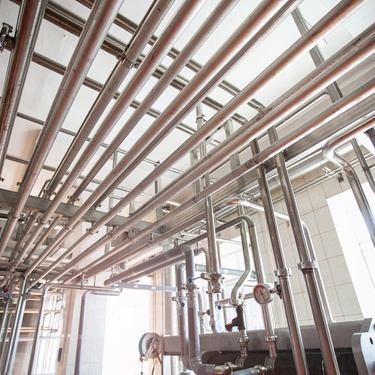
Food manufacturing is one of the main industries that rely on process piping. This network of pipes looks different for every application, and in the food industry, the main concern is sterility. Therefore, the materials good for process piping in food plants are ones that promote sanitation and easy maintenance. Read on to learn about the best, most popular materials and why they are so widespread.
What To Consider When Choosing Materials for Food Plant Piping
Efficiency, quality, and scalability are the main components of the role of industrial pipes in modern manufacturing, including food production. To achieve these markers, process piping must be made of the right materials. Food plant managers should consider these factors when selecting piping for their operations:
- Hygiene: The material must be easy to clean and prevent bacterial growth.
- Corrosion resistance: The material should withstand contact with food, cleaning chemicals, and varying temperatures without corroding.
- Durability: The material must endure high-pressure systems and frequent use over time.
- Regulatory compliance: Materials must meet food safety guidelines set by entities like the FDA or USDA.
The Best Materials for Process Piping in Food Plants
Now, let’s explore the materials good for process piping in foods plants because they meet the above criteria.
1. Stainless Steel
Stainless steel is by far the gold standard in food processing plants. It’s highly durable, corrosion-resistant, and easy to clean. The most common grades are 304 and 316 stainless steel.
- 304 stainless steel is versatile, cost-effective, and resistant to most acids and cleaning chemicals.
- 316 stainless steel offers better resistance to extreme temperatures, harsh chemicals, and saline environments.
Additionally, stainless steel has a non-porous or minimally porous surface, which prevents bacterial buildup, making it an excellent choice for maintaining food hygiene.
2. Food-Grade Plastics
Plastics like HDPE (high-density polyethylene) and polypropylene are lightweight and resistant to chemicals, making them an alternative for low-pressure systems. While they lack the durability of stainless steel, they are cost-effective and can work in many applications.
Final Thoughts
Food plants must adhere to the highest standards of sanitation and safety to protect consumers. Stainless steel is the best material for every food plant’s process piping because it is so strong and sterile. However, a few food-grade plastics can also work and appeal to stricter budgets. By carefully matching the material to the plant’s requirements, food manufacturers can maintain high production standards while minimizing risks and costs.
Bio: Casey is a passionate copyeditor highly motivated to provide compelling SEO content in the digital marketing space. Her expertise includes a vast range of industries from highly technical, consumer, and lifestyle-based, with an emphasis on attention to detail and readability.



















